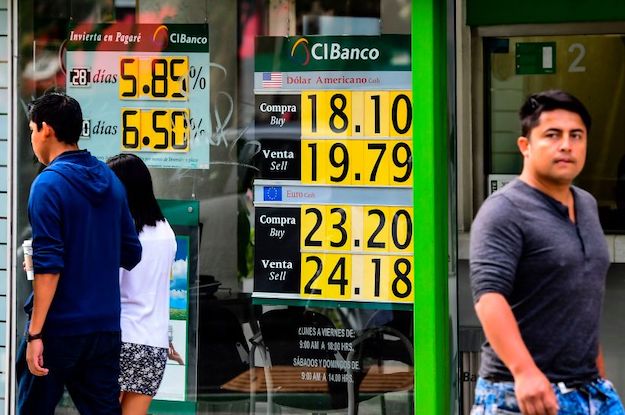After what seemed to be a smooth transition between the Enrique Peña Nieto administration and the incoming government of Andrés Manuel López Obrador (widely known as AMLO), things have started to get shaky in Mexico. Investors are asking questions about the country they didn’t used to ask. Amid the instability and uncertainty of emerging market politics, Mexico has traditionally provided something of a safe haven from political risk. But with the new chapter that Mexico is about to enter, analysts, Mexico enthusiasts, and investors will have to recalibrate the way they think about politics, and the way they incorporate this understanding in their decision making.
After the 1994 Tequila crisis and the multiple financial crises that preceded it, the Mexican government adopted a technocratic mantra: Thou shalt preserve macroeconomic and market stability. That meant a sophisticated and market-friendly bureaucracy that made predictable and economically rational policy decisions (albeit with mixed results). This made it simpler to make investment decisions. One had only to pay attention to macroeconomic variables, the U.S. Federal Reserve, the Mexican Central Bank, and changes in oil prices. Over the past 20 years, what drove volatility and financial uncertainty were external shocks, such as the dot-com bubble, the great recession of 2008, the 2014 decline in oil prices, and foreign political events such as President Donald Trump’s election victory and his subsequent threats to terminate NAFTA.
Domestic politics rarely generated major shakeups, and these were usually market-positive (electoral results or the approval of Peña Nieto’s reform agenda, for example). The foreign and domestic business community didn’t have to worry much about politics.
This is about to change. The market friendliness and the premeditated disposition towards stability that has marked Mexican governments will not be the guiding light of the new people on power. The premises used by the business community to analyze Mexico will need to be adjusted.
AMLO has not started governing yet – his inauguration will take place on Dec. 1 – but over the past month we have already seen a bit of what this change will represent. After organizing a questionable referendum that led to the cancellation of a $13 billion airport project, investors ran to sell Mexican assets leading the currency and the stock markets to their worst close since Trump’s election in 2016.
A week later, a member of AMLO’s Morena party introduced a bill to Congress proposing to eliminate several bank fees. In a matter of hours, the Mexican stock exchange collapsed over 5 percent.
AMLO rejected the bank fee proposal but the damage was done. These two examples point at what to expect from the incoming administration and the way AMLO thinks and will make decisions. His views on issues that he cares deeply about, such as the airport, energy or social policy, will be pushed forward regardless of what the market signals. Economic and market rationality are not what will drive the core of the new government’s decisions, it will be political and ideological. And this represents a major qualitative and material change to the way government in Mexico operates and to the signals the market and investors will have to learn to read and understand.
It is far from ideal for a government to fall prey to the markets. Responding to every movement of the exchange rate or to bondholders’ mood is a slippery slope on which Mexican technocratic governments might have fallen too often. But making decisions that erode the trust of the market and risk the well-earned stability of the last decades could be worse. One thing is to not be captured by the calamities of the market, the other is to not understand the signals it is sending.
Uncertainty and volatility are already occurring, caused by domestic variables as has not happened in many years. Get used to it. Politically driven volatility is here to stay.
—
Petersen is the Latin America and Mexico analyst at the political risk consulting firm Eurasia Group, and co-author of “Lost Applause: Analysis of the Enrique Peña Nieto Administration” (in Spanish).








